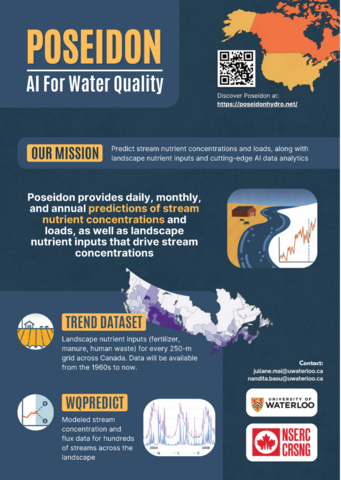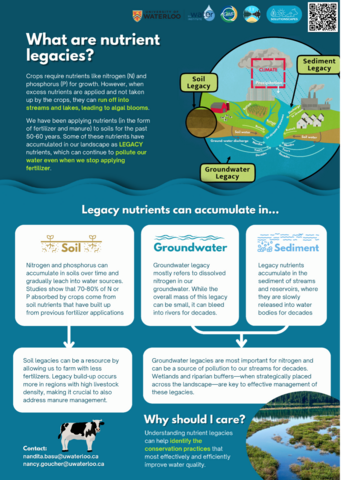Building resilience through innovation: University of Waterloo research showcased at leading conservation conference in Toronto
Members of Professor Nandita Basu’s Global Water Sustainability and Ecohydrology Lab, in the Departments of Earth and Environmental Sciences and Civil and Environmental Engineering, presented pioneering strategies to protect Great Lakes waters at the Latornell Conservation Symposium in Vaughan, ON, held from October 8-9, 2024.
The Latornell Symposium is an annual event that convenes Conservation Authorities, researchers, policymakers, industry experts, and other environmental professionals to discuss critical issues affecting Ontario’s communities and ecosystems.
Over 160 practitioners attended the lab's workshop titled: “Collaborative Strategies to Safeguard Great Lakes Waters in a Changing Climate.” The session focused on pressing water challenges including the buildup of legacy nutrients in soil, the impact of livestock waste on water quality, and the rising levels of dissolved phosphorus in streams across Ontario.
“Our machine learning models, combined with monitoring data, help us understand what drives changes in phosphorus and nitrogen concentrations across the province and reveal hidden phosphorus hotspots in watersheds,” said Nandita Basu, Canada Research Chair in Global Water Sustainability and Ecohydrology. “These insights can support a range of decisions, from optimizing the placement of Beneficial Management Practices (BMPs) to determining appropriate fertilizer application rates.
Chris Van Esbroeck, an Agricultural Stewardship Specialist with the Upper Thames River Conservation Authority, found the research eye-opening. “It was surprising to learn that dissolved phosphorus levels are rising even in forested areas,” he said. “This underscores the need to understand what’s driving these changes beyond land management.”
The two-hour workshop, organized by Basu’s team and the Water Institute, aimed to foster collaboration between researchers and practitioners, aligning with the conference’s theme on collaboration. “The conference offered a unique opportunity to share our research directly with those who can apply the information to improve water quality in practical, actionable ways,” said Nancy Goucher, Knowledge Mobilization Specialist at the Water Institute and co-organizer of the workshop. “Our goal was to create a collaborative space where ideas and expertise could flow freely, helping to bridge the gap between science and policy.”
Feedback from workshop participants was highly positive. “The conference reinforced the value of bringing multiple stakeholders together to respond to the research,” said Mel Luymes, a member of the Lake Futures Steering Committee. “The discussions reminded me that Ontario has a strong and diverse community committed to protecting both natural and developed environments,” said Todd Howell, a retired civil servant.
To learn more about the projects discussed during the workshop, please visit the following websites:
- Lake Futures: This project enhances understanding of Great Lakes eutrophication through models, data, and tools that assess the interplay between land use, lake processes, ecosystem health, and economic values. It is part of the Global Water Futures program, funded by the Canada First Research Excellence Fund.
- SOLUTIONSCAPES: Focused on Canada’s transition to a net-zero future, this project examines sustainable agriculture, wetland restoration, and waste-to-energy solutions that address water quality, climate emissions, and food security. SOLUTIONSCAPES is funded by Canada’s Climate Action Awareness Fund.
- POSEIDON: This innovative web-based water quality portal will provide daily, monthly, and annual predictions of stream nutrient concentrations and loads, along with landscape nutrient inputs and cutting-edge data analytics. POSEIDON is funded by a NSERC Alliance grant.

